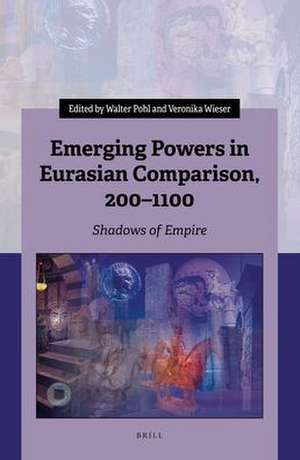Emerging Powers in Eurasian Comparison, 200–1100: Shadows of Empire
Walter Pohl, Veronika Wieseren Limba Engleză Hardback – 10 ian 2023
Contributors are Alexander Beihammer, Maaike van Berkel, Francesco Borri, Andrew Chittick, Michael R. Drompp, Stefan Esders, Ildar Garipzanov, Jürgen Paul, Walter Pohl, Johannes Preiser-Kapeller, Helmut Reimitz, Jonathan Shepard, Q. Edward Wang, Veronika Wieser, and Ian N. Wood.
Preț: 775.53 lei
Preț vechi: 945.77 lei
-18% Nou
Puncte Express: 1163
Preț estimativ în valută:
148.42€ • 154.38$ • 122.53£
148.42€ • 154.38$ • 122.53£
Carte indisponibilă temporar
Doresc să fiu notificat când acest titlu va fi disponibil:
Se trimite...
Preluare comenzi: 021 569.72.76
Specificații
ISBN-13: 9789004518568
ISBN-10: 9004518568
Pagini: 480
Dimensiuni: 155 x 235 mm
Greutate: 0.58 kg
Editura: Brill
Colecția Brill
ISBN-10: 9004518568
Pagini: 480
Dimensiuni: 155 x 235 mm
Greutate: 0.58 kg
Editura: Brill
Colecția Brill
Notă biografică
Walter Pohl, Dr. phil. (1984), was formerly Professor of Medieval History at the University of Vienna and director of the Institute for Medieval Research at the Austrian Academy of Sciences. He has published on the transformation of the Roman World, on the migration period, on problems of identity, on comparative history and on the world of the steppe, including his monograph The Avars (2018).
Veronika Wieser, Dr. phil. (2015), is a Postdoctoral Researcher at the Institute for Medieval Research at the Austrian Academy of Sciences. Her research covers eschatology and apocalyptic thought as well as ascetic communities and historiography in Late Antiquity and the early Middle Ages. She has published Historiography and Identity: Ancient and Christian Narratives (with Walter Pohl, 2019) and Cultures of Eschatology (with Vincent Eltschinger and Johann Heiss, 2020).
Veronika Wieser, Dr. phil. (2015), is a Postdoctoral Researcher at the Institute for Medieval Research at the Austrian Academy of Sciences. Her research covers eschatology and apocalyptic thought as well as ascetic communities and historiography in Late Antiquity and the early Middle Ages. She has published Historiography and Identity: Ancient and Christian Narratives (with Walter Pohl, 2019) and Cultures of Eschatology (with Vincent Eltschinger and Johann Heiss, 2020).
Cuprins
Preface
List of Figures
Contributors
Introduction: The Emergence of New Polities in the Shadows of Empire
Walter Pohl and Veronika Wieser
1 When Did the West Roman Empire Fall?
Ian N. Wood
2 The Role of Peoples in the Emergence of the Post-Roman Kingdoms
Walter Pohl
3 In the Shadow of the Roman Empire: Layers of Legitimacy and Strategies of Legitimization in the Regna of the Early Medieval West
Stefan Esders
4 When the Bavarians Became Bavarian
The Politicization of Ethnicity and Crystallization of Ethnic Identities in the Shadow of Carolingian Rule (8th to 9th Century)
Helmut Reimitz
5 Peripheral Polities North of the Carolingian Realm: The Regnum Danorum
Ildar Garipzanov
6 The Lagoons as a Distant Mirror: Constantinople, Venice and the Italian Romania
Francesco Borri
7 Countering Byzantium’s Shadow: Contrarianism among the Bulgars, Rus and Germans
Jonathan Shepard
8 Early Medieval Armenia between Empires (Fourth-Eleventh Century CE): Dynamics and Continuities
Johannes Preiser-Kapeller
9 Strategies of Legitimation in the Shadow of Empires: Byzantine–Turkish Contact Zones in Eleventh- and Twelfth-Century Asia Minor
Alexander Beihammer
10 Communication between Centre and Periphery in the Early Tenth-Century Abbasid Empire
Maaike van Berkel
11 Local and Imperial Rule: Examples from Frs (9th–10th Centuries)
Jürgen Paul
12 The Huai Frontier and the Ethnicization of Difference in Early Medieval China
Andrew Chittick
13 ‘Cultural China’ from the Eleventh Century: Legitimacy, Metanarrative and Historiography
Q. Edward Wang
14 In the Shadows of Empires: The Tuyuhun and Khitans in Late Antiquity
Michael R. Drompp
15 Post-imperial Polities: Concluding Observations
Walter Pohl
Index
List of Figures
Contributors
Introduction: The Emergence of New Polities in the Shadows of Empire
Walter Pohl and Veronika Wieser
PART 1: The Later Roman Empire and the Post-Roman Kingdoms in the West
1 When Did the West Roman Empire Fall?
Ian N. Wood
2 The Role of Peoples in the Emergence of the Post-Roman Kingdoms
Walter Pohl
3 In the Shadow of the Roman Empire: Layers of Legitimacy and Strategies of Legitimization in the Regna of the Early Medieval West
Stefan Esders
PART 2: The Carolingian Empire and the Emerging Polities in Its Northern and Eastern Periphery
4 When the Bavarians Became Bavarian
The Politicization of Ethnicity and Crystallization of Ethnic Identities in the Shadow of Carolingian Rule (8th to 9th Century)
Helmut Reimitz
5 Peripheral Polities North of the Carolingian Realm: The Regnum Danorum
Ildar Garipzanov
PART 3: Byzantium and Its Peripheral Powers
6 The Lagoons as a Distant Mirror: Constantinople, Venice and the Italian Romania
Francesco Borri
7 Countering Byzantium’s Shadow: Contrarianism among the Bulgars, Rus and Germans
Jonathan Shepard
PART 4: Between Byzantium and the Islamic World
8 Early Medieval Armenia between Empires (Fourth-Eleventh Century CE): Dynamics and Continuities
Johannes Preiser-Kapeller
9 Strategies of Legitimation in the Shadow of Empires: Byzantine–Turkish Contact Zones in Eleventh- and Twelfth-Century Asia Minor
Alexander Beihammer
PART 5: The Abbasid Caliphate and the Formation of New Dynasties
10 Communication between Centre and Periphery in the Early Tenth-Century Abbasid Empire
Maaike van Berkel
11 Local and Imperial Rule: Examples from Frs (9th–10th Centuries)
Jürgen Paul
PART 6: Medieval China and the Foreign Dynasties
12 The Huai Frontier and the Ethnicization of Difference in Early Medieval China
Andrew Chittick
13 ‘Cultural China’ from the Eleventh Century: Legitimacy, Metanarrative and Historiography
Q. Edward Wang
14 In the Shadows of Empires: The Tuyuhun and Khitans in Late Antiquity
Michael R. Drompp
15 Post-imperial Polities: Concluding Observations
Walter Pohl
Index
